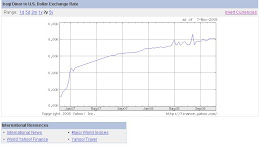The bulletin issued by the Emirates Center for Strategic Studies and Researches confirmed, according to Salih, that this law will allow all Iraqis to share in the incomings of oil wealth through a special fund in Baghdad to be distributed equally to the different governorates, according to the number of population, taking into account the injustice inflicted upon some governorates by the regime of Saddam Hussein.
The editorial stated that what it is more important is that these statements of the Iraqi Deputy Prime Minister came at a time in which the President of the Kurdistan Massoud Barzani said, during a press conference with American Secretary of State Condoleezza Rice during her visit to Iraq, that he supported the equitable distribution of oil revenues to Iraqis.
It added that the controversy over the distribution of oil revenues forms a major part of many serious and ongoing disputes on the Iraqi arena since the overthrow of Saddam Hussein, like the relationship between Shiites and Sunnis or between Kurds and other Iraqis as well as other disputes that prevail over the political attitudes of some Iraqi forces.
It went on to say that oil is particularly concentrated in the northern provinces of the Kurdish and the southern of the majority Shiite, which led to the concern of the Sunnis who have been stationed in the middle of being deprived of the oil revenues through the draft or federal territories and that is why they strongly oppose federalism. The way oil and its resources are exploited is one of the main causes of tension between the Kurds and the Iraqi government that refuses some aspects of the Kurdish independence in dealing with this issue.
It considered that one of the most important principles and foundations of the unified State, where all Iraqis agreed to live together, is that its different resources are the property of all Iraqis and their shares in it are determined according to objective considerations mandated by a central administration and not according to geographical, ethnic or sectarian considerations.
It believed that to make oil a factor for unification and not divisive or conflict, a blessing and not a curse, each Iraqi citizen must feel as a partner in its resources which are distributed fairly and objectively in various governorates, regardless of the fact that it is an oil province or not.
The editorial concluded that oil is at the core of people's lives. If disputes over it are not settled, it could evolve seriously because it concerns a fundamental wealth that everyone finds it his right to participate in and enjoy its returns, especially after decades of squandering this wealth in a losing adventures during the time of the ex-regime. (Source)AlBayan

